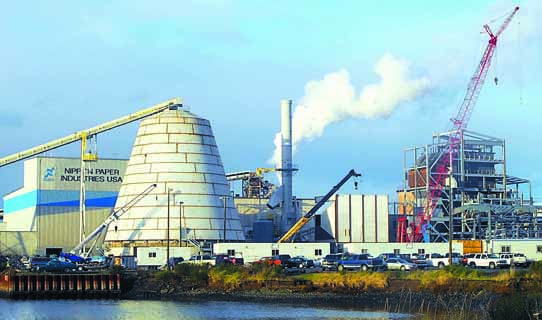PORT ANGELES — Nippon Paper Industries USA may have cleared the last permit hurdle for the company’s disputed biomass cogeneration plant.
The Olympic Region Clean Air Agency has given preliminary approval for a dual-cell, 5,500-gallon-per-minute cooling tower for the project at the base of Ediz Hook.
An ORCAA public hearing on the permit is scheduled for 5 p.m. Jan. 14 in Room 160 at the Clallam County Courthouse, 223 E. Fourth St., Port Angeles.
“The preliminary conclusion is that it does not pose a health concern . . . and it complies with all the applicable air regulations,” ORCAA Professional Engineer Mark Goodin said Friday.
Mill Manager Harold Norlund last week called the preliminary decision “a good sign” and said the project remains on schedule for completion by Sept. 1.
He said the project is moving forward despite Port Townsend Paper Corp.’s recent decision to delay the $55 million expansion of its own biomass cogeneration plant over concerns about green energy and an overall weak market for energy.
“We will wait for the final approval,” Norlund said, adding that the ORCAA permit is the last of the numerous city, county, state and federal approvals that the company needs to obtain.
In June, a Thurston County Superior Court judge rejected an appeal against ORCAA, the state Department of Ecology and Nippon that was filed by seven environmental groups in response to the state Pollution Control Hearings Board upholding ORCAA’s permit for the cogeneration project.
The cooling tower project was reviewed at the request of the North Olympic Group Sierra Club, group Vice Chairman Bob Sextro of Sequim said Friday.
The organization was among those groups that filed the Thurston County Superior Court challenge.
“From a permitting standpoint, this is sort of the final hurdle,” Sextro said.
“At this point, we are not planning any kind of appeal.”
The cooling tower and the boiler should have been evaluated together, he said.
“They are integral to one another,” Sextro said.
Emissions from the cooling tower and the boiler, combined, are what concerns project opponents, Sextro said.
“By separating the two, they avoided a major source review under the Washington Administrative Code.”
The cooling tower will be used in conjunction with a biomass boiler that is being built at the company’s Ediz Hook plant, which produces telephone-directory paper newsprint.
The $71 million project, which includes a 125-foot exhaust stack, will include a 110-foot biomass boiler that will burn wood waste to create up to 20 watts of electricity.
Filtered water from the Elwha River that will cool the plant’s turbine surface condenser.
The water sometimes needs to be cooled for use as process water in the mill, according to ORCAA’s Nov. 26 Preliminary Determination for Notice of Construction.
The draw-down will decrease water consumption from the river by more than 2 million gallons a day.
The National Park Service is adding sodium hypochlorite — the active ingredient in bleach — to the industrial pipeline that leads to the Elwha Water Treatment Plant five miles upstream from the mill until the project to remove two Elwha River dams is completed by May 2013.
ORCAA requested additional information on the project to evaluate the consequences of residual chlorine remaining in the river water after it reaches the mill and its impact on cooling tower emissions, according to the Notice of Construction.
“We concluded essentially that we can go forward with the approval, that there really is not a significant air quality consequence of the [National Park Service] adding these chemicals to the river,” Goodin said.
If the permit is approved, Nippon can still expect to hear from opponents, Sextro said.
“The next hurdle in line is the source emission testing once they fire up the boiler,” he said.
The company has to pass all the limits that are set out in the permit, Sextro said, estimating those tests could take place by the end of 2013.
“There is still that one more hurdle before they can operate 24-7, 365 days a year, and we are going to be watching that closely,” Sextro said.
“There has been more than one biomass boiler around the country that has failed those tests at one time or another,” he added.
“We might be talking a year from now, when their results are in, and if they fail, what’s going to happen.”
Senior Staff Writer Paul Gottlieb can be reached at 360-452-2345, ext. 5060, or at paul.gottlieb@peninsuladailynews.com.

